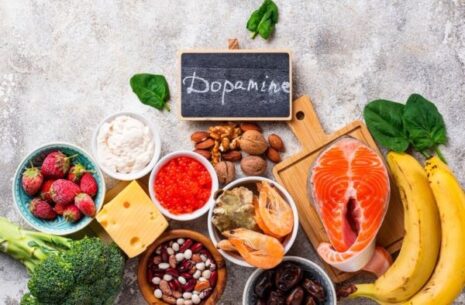Are you feeling down, unmotivated, or uninspired? It might be time to give your brain a burst of dopamine! Dopamine is a neurotransmitter that plays a key role in motivation, pleasure, and reward. Maintaining healthy levels of dopamine can improve your mood, increase your productivity, and even boost your overall well-being. In this article, we’ll take a closer look at dopamine and how you can naturally boost its production in your brain.
Understanding Dopamine and Its Importance in Our Body
Dopamine is a neurotransmitter that is produced in the brain. It is responsible for transmitting signals between neurons and plays a key role in regulating mood, motivation, and reward. Dopamine acts as a natural painkiller and is also involved in the body’s stress response. Low levels of dopamine can lead to symptoms such as depression, anxiety, and fatigue, while healthy levels can help you feel motivated, energized, and happy.
Research has shown that dopamine also plays a role in addiction. Drugs such as cocaine and methamphetamine increase dopamine levels in the brain, leading to feelings of euphoria and pleasure. However, prolonged drug use can lead to a decrease in dopamine production, which can result in addiction and withdrawal symptoms.
In addition to its effects on mood and addiction, dopamine also plays a role in movement and coordination. Low levels of dopamine can lead to movement disorders such as Parkinson’s disease, while high levels can cause hyperactivity and involuntary movements.
Tips to Increase Dopamine Naturally
Here are the below steps you need to follow boost your dopamine naturally
1. Use Natural Foods That Increase Dopamine Production in the Brain

One of the easiest ways to boost your dopamine levels is simply by changing your diet. Here are a few foods that are known to promote dopamine production:
- Bananas
- Fatty fish, such as salmon and tuna
- Dark chocolate
- Almonds and walnuts
- Coffee and tea
- Avocado
- Eggs
Try incorporating these foods into your diet to give your brain a natural dopamine boost.
In addition to these foods, there are also certain spices and herbs that can help increase dopamine levels in the brain. For example, turmeric, which is commonly used in Indian cuisine, has been found to have a positive effect on dopamine production. Similarly, ginseng, a popular herb in traditional Chinese medicine, has been shown to increase dopamine levels and improve cognitive function.
It’s important to note that while these foods and herbs can help boost dopamine levels, they should not be relied upon as the sole solution for dopamine-related issues. It’s always best to consult with a healthcare professional if you are experiencing symptoms of low dopamine or other mental health concerns.
2. Make Changes your Lifestyle to Boost Dopamine Naturally
In addition to changing your diet, there are many lifestyle changes you can make to help boost your dopamine levels. Here are a few ideas:
- Exercise regularly
- Spend time in nature
- Meditate regularly
- Set and achieve goals
- Socialize with friends and family
- Get enough sleep
These simple lifestyle changes can help promote dopamine production in the brain, leading to increased motivation, happiness, and overall well-being.
Another effective way to boost dopamine levels is to engage in activities that you enjoy. Whether it’s playing a musical instrument, painting, or dancing, doing something that brings you pleasure can increase dopamine production in the brain. Additionally, practicing gratitude and expressing appreciation for the good things in your life can also help boost dopamine levels and improve your mood.
Exercises That Help Boost Dopamine Instantly
If you’re looking for an immediate dopamine boost, try incorporating some of these exercises into your routine:
- Dancing
- Listening to music
- Singing
- Laughing or watching a funny movie
These simple exercises can help stimulate dopamine production in the brain, leading to an instant mood boost and burst of energy.
In addition to these exercises, there are also certain foods that can help increase dopamine levels in the brain. Foods high in protein, such as eggs, fish, and chicken, contain amino acids that are essential for dopamine production. Other foods that can help boost dopamine include dark chocolate, bananas, and avocados. Incorporating these foods into your diet along with these exercises can help improve your overall mood and energy levels.
Mindfulness Techniques to Increase Dopamine Levels
Mindfulness practices, such as meditation and yoga, have been shown to promote dopamine production in the brain. These practices can also help reduce stress and anxiety, leading to greater overall well-being. Try incorporating a few minutes of mindfulness into your daily routine to give your dopamine levels a natural boost.
The Role of Sleep and Rest in Maintaining Healthy Dopamine Levels
Getting enough sleep and rest is essential for maintaining healthy dopamine levels. When you’re sleep deprived or overly stressed, your brain’s dopamine production can suffer. Make sure you’re getting enough sleep each night and taking time to rest and recharge during the day.
3. Use Supplements That Can Help Boost Dopamine Production
There are many natural supplements that can help promote dopamine production in the brain. Here are a few to consider:
- L-tyrosine
- Magnesium
- Vitamin D
- Ginkgo biloba
If you’re considering taking any of these supplements, be sure to talk to your doctor first to make sure they’re safe and appropriate for you.
Also Check: What Is Dopamine Fasting And How Can It Make Us Happier?
How Low Dopamine Levels Affect Your Mood and Mental Health
Low levels of dopamine can lead to a range of symptoms and feelings, including:
- Loss of interest in activities that once were pleasurable
- Feeling unmotivated and fatigued
- Low mood and depression
- Difficulty concentrating and focusing
- Insomnia and difficulty sleeping
- Increased anxiety and stress
If you’re experiencing any of these symptoms, it’s worth considering whether your dopamine levels might be lower than they should be. Fortunately, there are many natural ways to boost dopamine production in the brain.
One of the most effective ways to increase dopamine levels is through exercise. Regular physical activity has been shown to increase dopamine production in the brain, leading to improved mood and motivation. Additionally, certain foods can also help boost dopamine levels, such as those high in protein, like fish, chicken, and eggs.
It’s important to note that while low dopamine levels can contribute to mental health issues, it’s not always the sole cause. If you’re experiencing persistent symptoms, it’s important to seek professional help from a mental health provider to determine the underlying cause and develop an appropriate treatment plan.
Precautions to Take While Trying to Increase Dopamine Levels Naturally
While natural methods of boosting dopamine production can be effective, it’s important to be mindful of any potential risks or side effects. Here are a few things to keep in mind:
- Avoid consuming too much sugar or processed foods, which can negatively impact dopamine production
- Do not consume alcohol or drugs, as they can deplete dopamine levels over time
- Avoid over-exercising, which can actually reduce dopamine levels over time
- If you have any preexisting medical conditions, consult with your doctor before making any significant changes to your diet or lifestyle
The Benefits of Maintaining Healthy Dopamine Levels
Keeping your dopamine levels in check can be hugely beneficial for your mental health and overall well-being. Here are just a few of the benefits of maintaining healthy levels of dopamine:
- Increased motivation and productivity
- Reduced anxiety and depression
- Improved memory and focus
- Gives a boost of happy feeling and well-being
- More energy
One of the key benefits of maintaining healthy dopamine levels is that it can help to reduce the risk of addiction. Dopamine is closely linked to the reward system in the brain, and when levels are imbalanced, it can lead to addictive behaviors. By keeping dopamine levels in check, individuals may be less likely to develop addictive tendencies.
Additionally, research has shown that maintaining healthy dopamine levels can also have a positive impact on physical health. Dopamine plays a role in regulating the immune system, and studies have suggested that imbalances in dopamine levels may contribute to autoimmune disorders. By keeping dopamine levels balanced, individuals may be able to support their immune system and reduce the risk of developing certain health conditions.
Conclusion
Boosting dopamine production in the brain can have a profound impact on your mood, motivation, and overall well-being. By following the tips outlined in this article, you can naturally increase your dopamine levels and enjoy a better quality of life. Remember to be patient and persistent – natural methods of boosting dopamine production may take time to show significant results, but the benefits are well worth the effort.
How can I naturally release dopamine?
You can naturally release dopamine through various ways, including exercising, consuming protein-rich foods, listening to music, meditating, getting enough sleep, spending time in nature, and practicing gratitude. All these activities stimulate the release of dopamine in the brain.
Can food affect dopamine levels?
Yes, certain foods such as those rich in amino acids can help boost dopamine levels in the brain. Foods such as fish, poultry, and eggs are high in amino acids that help produce dopamine.
How does exercise affect dopamine levels?
Exercise stimulates the release of dopamine and other “feel-good” neurotransmitters in the brain. It triggers the reward system, which in turn releases dopamine that makes you feel good and motivated.
Does sleep affect dopamine levels?
Yes, lack of sleep can lower dopamine levels in the brain. Getting enough sleep allows the brain to produce enough dopamine to regulate mood and motivation.
Can meditation increase dopamine levels?
Yes, meditation has been shown to increase dopamine levels in the brain. It can reduce stress and anxiety, which are known to lower dopamine levels.
Can gratitude affect dopamine levels?
Yes, practicing gratitude can increase dopamine levels in the brain. Gratitude stimulates the brain’s reward system, which releases dopamine and makes you feel good.
















